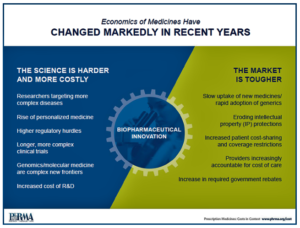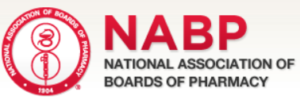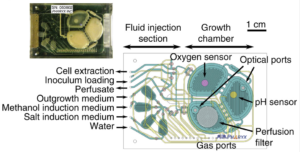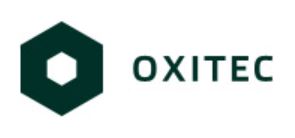- Putting the cost of medicines in context (catalyst.phrma.org)
Discussions about costs are important. No patient should have to worry about whether they can afford the care they need. At the same time, it is important to look at costs across the health care system and not just the share going toward life changing medicines...new therapies are transforming care for patients fighting debilitating diseases like cancer, hepatitis C, high cholesterol and more. In the midst of all this progress, the share of spending on retail medicines remains the same as it was 50 years ago. In fact, government actuaries project the share of health care spending attributable to medicines will continue to grow in line with overall health care cost growth for at least the next decade...Our updated Prescription Medicines: Costs in Context explains how competition among brand-name medicines, high generic utilization rates and aggressive tactics by insurers and pharmacy benefit managers to negotiate lower prices all help to keep costs under control...
- Rogue online sellers feeding drug abuse (chaindrugreview.com)Internet Drug Outlet Identification Program Progress Report for State and Federal Regulators: July 2016 (s3.amazonaws.com)
Drug abuse, including misuse of prescription drugs, remains at alarmingly high levels...Feeding this epidemic, the National Association of Boards of Pharmacy says, are rogue Internet drug outlets illegally dispensing prescription controlled substances...illicit online drug sellers "hiding behind sleek websites" are making it easier for people struggling with drug abuse to purchase controlled-substance medications. However, since these rogue websites often sell counterfeit and tainted substances, buyers can raise the risk of overdose and death...researchers used popular search engines (Google, Bing and Yahoo), shopping websites (eBay, Craigslist, Yahoo! Shopping, Overstock.com, Etsy, Oodle, eCRATER, Bonanza, Sell.com, Blujay and Alibaba) and social media sites (YouTube and Twitter) to gauge the availability of the opioids Demerol, Dilaudid, Duragesic, Exalgo, Kadian, Lorcet, Lortab, Percocet, Roxicet, Vicodin and Zohydro. Opioids were easiest to find and readily available by using search engines, the researchers discovered. Still, no matter which online avenue was used, researchers found that the final destination was a dedicated website selling opioids illegally.
- Device makes single doses of drugs on demand (upi.com)Synthetic biology and microbioreactor platforms for programmable production of biologics at the point-of-care (nature.com)
A portable device may allow doctors to create single doses of biopharmaceutical medications on demand, potentially speeding the treatment of diseases that include diabetes and cancer...The portable production system was developed by scientists at the Massachusetts Institute of Technology, with funding from the U.S. Defense Advanced Research Projects Agency, expecting the device could be useful for the battlefield and remote areas to produce treatments immediately at the point of care...The system...can currently produce two biologic drugs from a single yeast strain in the device, creating near-single-dose production in less than 24 hours with limited infrastructure...The production system uses a programmable strain of yeast, Pichia pastoris, which produces two proteins used for disease therapy...The strain of yeast, which can grow at very high densities when exposed to carbon sources, expressed recombinant human growth hormone when exposed to estrogen β-estradiol and expressed the protein interferon when exposed to methanol...The potential use for the device is significant, as it can be used for everything from treatments on a battlefield where immediate care is required to prevention of a disease outbreak in a remote village...
- This smells promising: Nasal bacteria pump out a new antibiotic that kills MRSA (statnews.com)The nose knows how to kill MRSA (nature.com)
Humans, and the microbes that live inside us, could be the source of the next generation of antibiotics...German researchers just discovered an antibiotic (lugdunin) produced by bacteria (S. lugdunensis) that inhabit our noses. This new antibiotic can kill MRSA (methicillin resistant S. aureus), the poster child for drug resistance and the culprit behind the most pernicious hospital-acquired staph infections..."Our study can help to understand what we can do to eradicate these pathogens from the microbiota of healthy people," said Andreas Peschel, lead author of the study, published...in Nature...
- The FDA just greenlit releasing mutant Zika-killing mosquitoes in Florida (fusion.net)Spraying Begins in Miami to Combat the Zika Virus (nytimes.com)Zika in the United States, explained in 9 maps (vox.com)
...the Food and Drug Administration gave the okay to a field trial that would release genetically modified Zika-killing mosquitoes in the Florida Keys...the FDA released a final environmental assessment of the trial, finding that it “will not have significant impacts on the environment.” The project, led by Oxitec, a biotech company that focuses on insect control, calls for the release of thousands of genetically engineered male Aedes aegypti mosquitoes. The lab insects are bred so that over time they could kill off much of the local mosquito population by passing on a gene fatal to any offspring they have with wild females...The FDA’s okay is a major step forward toward a U.S. implementation of the technology at a time of much concern over the spread of Zika in the U.S. after cases in Florida...
- Veeva Streamlines Drug Giants’ Ability To Get Medicine Approvals (investors.com)
When health care behemoth Johnson & Johnson decided last year to use Veeva Systems' software for gathering data from clinical trials needed to get a new drug approved, Veeva's rivals took notice..."They (J&J) said we're going to standardize this globally, and within 12 months we had 6 customers (among the 20 biggest drugmakers) do the exact same thing,"...one... goal in mind -- replace biopharma companies' legacy systems with cloud-based software designed to make their painstaking regulatory requirements a lot less painful...The cost of developing a new drug has soared to $2.6 billion, up from about $1 billion in 2000 in inflation-adjusted dollars, according to the Pharmaceutical Research and Manufacturers of America. Because the stakes are so high, more large drug developers have decided in rapid succession to junk their prior technology investments...The key to Veeva's success is that it has brought together enterprise software expertise with industry-specific expertise...
- Precision medicine market to skyrocket past $87 billion (healthcareitnews.com)
Cancer treatments, drug discovery, genome sequencing...are all driving big spending for personalized and precision medicine...Driven by demand for personalized medicine in cancer treatments and advancements in new healthcare technologies, the precision medicine market is expected to reach $87.79 billion by 2023, according to a report by Global Market Insights...Revenue growth will be sustained by favorable government regulations and standards...The trend toward an individualized diagnosis approach is growing thanks to large-scale biologic database development, efficient methods for patient characterization, and computational tools to analyze large data sets...Recent research advances have helped expand benefits to various aspects of healthcare by enabling better understanding of disease mechanisms, assessment of disease risks and prediction of optimal therapy...A large number of investments in diagnostic research will further accelerate the shift from treatment to preventive medicine in healthcare...
- Pharmacy Week in Review: August 5, 2016 (pharmacytimes.com)
Cate Douglass, PTNN. This weekly video program provides our readers with an in-depth review of the latest news, product approvals, FDA rulings and more.
- GSK and Google launch bioelectronics venture (pmlive.com)Q&A: Glaxo exec says bioelectronics is ‘not science fiction’ (statnews.com)
GlaxoSmithKline has joined forces with Google's Verily Life Sciences to establish a new company dedicated to the development of bioelectronic medicines...Galvani Bioelectronics - named for the 18th century Italian bioelectricity pioneer - will combine GSK's drug discovery and development expertise in disease biology with Verily's expertise in highly miniaturised technologies, including data analytics and software development for clinical application...Together, we can rapidly accelerate the pace of progress in this exciting field, to develop medicines that truly speak the electrical language of the body...Bioelectronic medicine is concerned with the electrical signals firing between the body's nervous system and organs, working to regulate the faulty nerve impulses that occur in many illnesses.
- This Week in Managed Care: July 30, 2016 (ajmc.com)
Justin Gallagher, associate publisher of The American Journal of Managed Care. Welcome to This Week in Managed Care...










